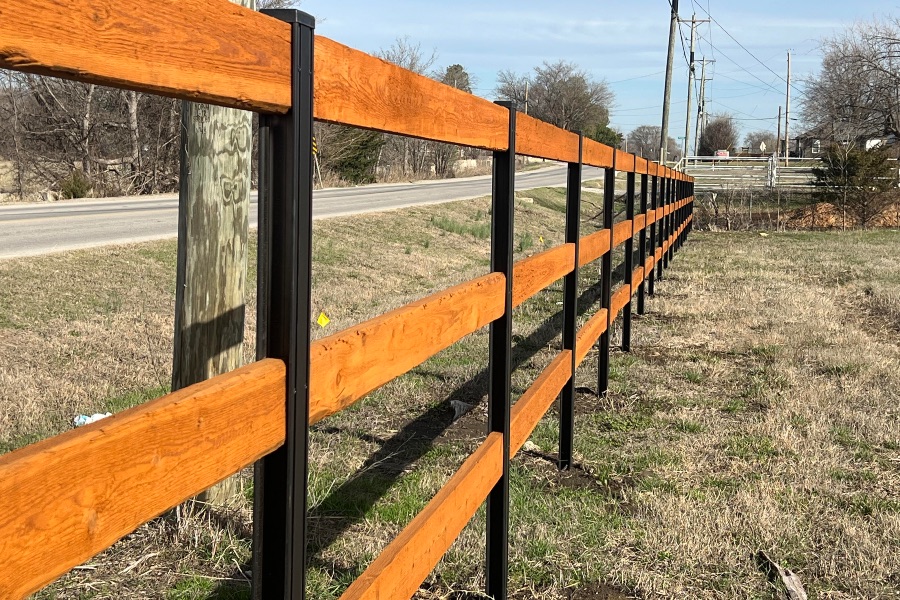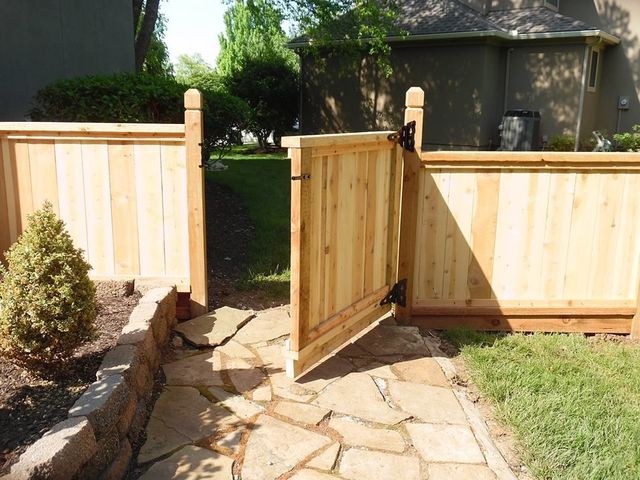All Categories
Featured
When you decide to set up a fence around your residential building, it's necessary to understand the permit needs details to your location. Here's an extensive appearance at the licenses you may require for fencing installment.
Why Do You Need a License for Fencing Installment? A fencing is greater than simply a barrier between residential or commercial properties-- it can influence safety, residential property value, aesthetics, and also ecological conditions. City governments require authorizations to make sure that fences fulfill particular standards and do not trigger issues for utilities, next-door neighbors, or the community all at once. Permits also make sure that the setup adheres to zoning regulations, developing codes, and safety guidelines.
![]()
Sorts Of Licenses You May Need. Structure Authorization. A structure license is just one of the most usual licenses needed for fence setup. This permit makes sure that the fencing satisfies regional building regulations. If you're building a fence over a particular elevation (usually over 6 feet), you'll likely require a structure license. The local structure division will usually assess the website and review plans to guarantee the structure is stable and does not obstruct public rooms or create threats.
Zoning License. Zoning laws govern just how land is made use of in a specific location, and they include laws about fencings. A zoning authorization ensures your fencing follows trouble, elevation, and place regulations. For instance, fences might need to be set back a certain distance from sidewalks, roads, or building lines to stop obstruction or disturbance with utilities. In many cases, zoning legislations can additionally define which products are permitted.
HOA Authorization. If your residential or commercial property belongs to a home owners association (HOA), you may require to seek authorization prior to mounting a fence. HOAs usually have standards that regulate the visual appeals and structure of fencings to guarantee they are in harmony with the area. You could require to submit your strategies for approval, and the HOA may limit fence height, design, or material.
Specialized Permits. In some locations, there might be extra authorizations needed for specific circumstances. If your fencing is near a protected ecological location or located in a flooding zone, you may require to get specialized licenses related to ecological influence. If the fence is in a location with below ground utilities, you might require to get clearance to avoid destructive pipelines or cords.
![]()
Easement or Utility Business Approval. Prior to mounting a fence, it's important to inspect whether the building includes an easement, such as an energy easement, which could influence where you can place your fencing. Easements are locations of land assigned for public or personal utilities, and you might require permission from the energy business or other authority to develop within this location.
Exactly How to Discover Out What Allows You Need. To guarantee that you're adhering to all the essential laws, below's exactly how you can identify the specific authorizations required for your fence installment:
![]()
Check Out Your Regional Federal Government Office: The very first step is to contact your local structure or zoning division. Numerous cities and areas have guidelines offered online that specify what kinds of authorizations are needed for fence installment. Otherwise, checking out the workplace or calling face to face can aid clarify the procedure. Check Your City's Website: Many municipalities provide details regarding fence installations and the licenses needed through their main internet sites. Some web sites even enable you to submit applications online. Seek Advice From a Fence Setup Expert: If you're unsure regarding regional laws, an expert fence professional can assist. They recognize with the permitting process and can assist you via the actions. The Repercussions of Not Getting a License. Stopping working to safeguard the needed authorizations prior to setting up a fence can result in significant consequences. For example, you may be fined or required to remove the fencing entirely. Furthermore, if you make a decision to sell your building in the future, the lack of a license might prevent prospective purchasers, as they might see it as an indicator that the residential or commercial property is not certified with local legislations. Ensuring that you have the proper licenses will conserve you time, money, and frustrations in the long run.
Conclusion. Installing a fencing around your residential property can add both protection and aesthetic allure, yet it is very important to ensure you're adhering to the legal actions in the procedure. Researching the certain authorization demands for your area, consisting of structure authorizations, zoning regulations, HOA authorization, and energy permissions, will assist guarantee your fencing installation goes efficiently. Putting in the time to comprehend these demands currently can save you from costly errors and potential legal issues down the line.
Why Do You Need a License for Fencing Installment? A fencing is greater than simply a barrier between residential or commercial properties-- it can influence safety, residential property value, aesthetics, and also ecological conditions. City governments require authorizations to make sure that fences fulfill particular standards and do not trigger issues for utilities, next-door neighbors, or the community all at once. Permits also make sure that the setup adheres to zoning regulations, developing codes, and safety guidelines.

Sorts Of Licenses You May Need. Structure Authorization. A structure license is just one of the most usual licenses needed for fence setup. This permit makes sure that the fencing satisfies regional building regulations. If you're building a fence over a particular elevation (usually over 6 feet), you'll likely require a structure license. The local structure division will usually assess the website and review plans to guarantee the structure is stable and does not obstruct public rooms or create threats.
Zoning License. Zoning laws govern just how land is made use of in a specific location, and they include laws about fencings. A zoning authorization ensures your fencing follows trouble, elevation, and place regulations. For instance, fences might need to be set back a certain distance from sidewalks, roads, or building lines to stop obstruction or disturbance with utilities. In many cases, zoning legislations can additionally define which products are permitted.
HOA Authorization. If your residential or commercial property belongs to a home owners association (HOA), you may require to seek authorization prior to mounting a fence. HOAs usually have standards that regulate the visual appeals and structure of fencings to guarantee they are in harmony with the area. You could require to submit your strategies for approval, and the HOA may limit fence height, design, or material.
Specialized Permits. In some locations, there might be extra authorizations needed for specific circumstances. If your fencing is near a protected ecological location or located in a flooding zone, you may require to get specialized licenses related to ecological influence. If the fence is in a location with below ground utilities, you might require to get clearance to avoid destructive pipelines or cords.

Easement or Utility Business Approval. Prior to mounting a fence, it's important to inspect whether the building includes an easement, such as an energy easement, which could influence where you can place your fencing. Easements are locations of land assigned for public or personal utilities, and you might require permission from the energy business or other authority to develop within this location.
Exactly How to Discover Out What Allows You Need. To guarantee that you're adhering to all the essential laws, below's exactly how you can identify the specific authorizations required for your fence installment:

Check Out Your Regional Federal Government Office: The very first step is to contact your local structure or zoning division. Numerous cities and areas have guidelines offered online that specify what kinds of authorizations are needed for fence installment. Otherwise, checking out the workplace or calling face to face can aid clarify the procedure. Check Your City's Website: Many municipalities provide details regarding fence installations and the licenses needed through their main internet sites. Some web sites even enable you to submit applications online. Seek Advice From a Fence Setup Expert: If you're unsure regarding regional laws, an expert fence professional can assist. They recognize with the permitting process and can assist you via the actions. The Repercussions of Not Getting a License. Stopping working to safeguard the needed authorizations prior to setting up a fence can result in significant consequences. For example, you may be fined or required to remove the fencing entirely. Furthermore, if you make a decision to sell your building in the future, the lack of a license might prevent prospective purchasers, as they might see it as an indicator that the residential or commercial property is not certified with local legislations. Ensuring that you have the proper licenses will conserve you time, money, and frustrations in the long run.
Conclusion. Installing a fencing around your residential property can add both protection and aesthetic allure, yet it is very important to ensure you're adhering to the legal actions in the procedure. Researching the certain authorization demands for your area, consisting of structure authorizations, zoning regulations, HOA authorization, and energy permissions, will assist guarantee your fencing installation goes efficiently. Putting in the time to comprehend these demands currently can save you from costly errors and potential legal issues down the line.
Latest Posts
Can Personalized Fences Include Gates and Entryways?
Published Dec 19, 24
0 min read
What Aspects Impact the Timeline for Fencing Installation?
Published Dec 19, 24
0 min read
What Permits Are Needed for Setting Up a Surround My Location?
Published Dec 19, 24
0 min read